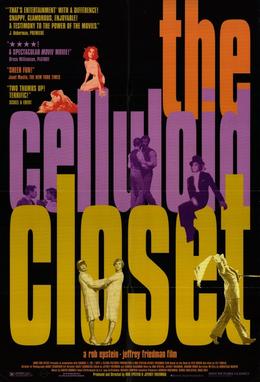These lists of television programs with LGBT characters include:

LGBT themes in speculative fiction include lesbian, gay, bisexual, or transgender (LGBTQ) themes in science fiction, fantasy, horror fiction and related genres.[a] Such elements may include an LGBT character as the protagonist or a major character, or explorations of sexuality or gender that deviate from the heteronormative.

The Celluloid Closet is a 1996 American documentary film directed and co-written by Rob Epstein and Jeffrey Friedman, and executive produced by Howard Rosenman. The film is based on Vito Russo's 1981 book The Celluloid Closet: Homosexuality in the Movies, and on lecture and film clip presentations he gave from 1972 to 1982. Russo had researched the history of how motion pictures, especially Hollywood films, had portrayed gay, lesbian, bisexual, and transgender characters.
The large amount of lists of LGBTQ characters and media within the scope of "fiction and myth", which has been divided into the following:

LGBT stereotypes are stereotypes about lesbian, gay, bisexual and transgender (LGBTQ) people based on their sexual orientations, gender identities, or gender expressions. Stereotypical perceptions may be acquired through interactions with parents, teachers, peers and mass media, or, more generally, through a lack of firsthand familiarity, resulting in an increased reliance on generalizations.

LGBTQ themes in horror fiction refers to sexuality in horror fiction that can often focus on LGBTQ+ characters and themes within various forms of media. It may deal with characters who are coded as or who are openly LGBTQ+, or it may deal with themes or plots that are specific to gender and sexual minorities.

Vito Russo was an American LGBT activist, film historian, and author. He is best remembered as the author of the book The Celluloid Closet, described in The New York Times as "an essential reference book" on homosexuality in the US film industry. In 1985, he co-founded the Gay and Lesbian Alliance Against Defamation (GLAAD), a media watchdog organization that strives to end anti-LGBT rhetoric, and advocates for LGBT inclusion in popular media.
Historically, the portrayal of lesbian, gay, bisexual, transgender and queer (LGBTQ) people in media has been largely negative if not altogether absent, reflecting a general cultural intolerance of LGBTQ individuals; however, from the 1990s to present day, there has been an increase in the positive depictions of LGBTQ people, issues, and concerns within mainstream media in North America. The LGBTQ communities have taken an increasingly proactive stand in defining their own culture, with a primary goal of achieving an affirmative visibility in mainstream media. The positive portrayal or increased presence of the LGBTQ communities in media has served to increase acceptance and support for LGBT communities, establish LGBTQ communities as a norm, and provide information on the topic.
LGBTQ+ media or gay media refers to media whose primary target audience are members of the LGBTQ community. Secondary targets are LGBTQ+ allies, and in some instances those who oppose gay rights may be targeted as a form of activism. Gay or queer media can also be defined as web sites, films, magazines and other cultural products that were created by queer individuals, or groups that are typically out, meaning that they are public or open about their identity. LGBTQ creators do not always include LGBTQ themes or issues in the media that they produce, but there are often at least subtle references to queerness in these media.

The following outline offers an overview and guide to LGBTQ topics:
Straightwashing is portraying LGBT or otherwise queer characters in fiction as heterosexual (straight), making LGB people appear heterosexual, or altering information about historical figures to make their representation comply with heteronormativity.
This is an index list of various lists of LGBT films split by decade, storyline and those made-for-television. Films directed by women, animated films as well as an alphabetical list of such movies are also included.
This page is based on this
Wikipedia article Text is available under the
CC BY-SA 4.0 license; additional terms may apply.
Images, videos and audio are available under their respective licenses.






